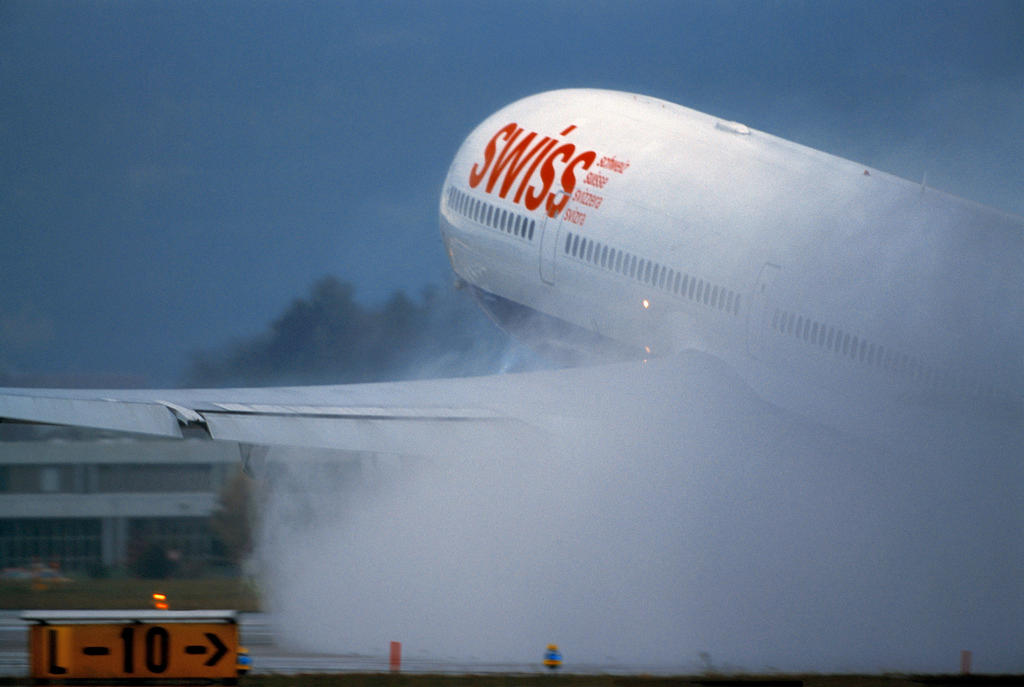Should academics be taking the plane for short trips?

The University of Basel is considering a proposal that students should take the train rather than fly for short-haul academic trips, as a way of cutting CO2 emissions. It’s not the only Swiss university looking at cutting down academic plane travel.
There has been much talk in recent years, in international circles, about the paradoxExternal link of researchers needing to collaborate and network but racking up many polluting air miles as they jet to conferences and events.
This was what was behind the “1,000-kilometre principle” discussed at a recent University of BaselExternal link Senate meeting and put forward by students. Under the proposal – the first of its kind in Switzerland – those studying at the university would take the train rather than the plane for university-organised trips under 1,000 kilometres (such as to Brussels or London) if there are “adequate train and travel links”. It would not affect professors’ research travel, according to the meeting’s minutesExternal link.
The university agreed with the students that more should be done regarding the issue of reducing flying.
Basel University spokesman Matthias Geering says that the university president’s office has called for a concept concerning flights in teaching and research, expected to be delivered in the second half of this year.
“The president‘s office is willing to reduce flights as much as possible,” Geering said via e-mail.
Measures taking off
The issue of reducing plane travel is being discussed at other Swiss universities as well. The University of NeuchâtelExternal link has announcedExternal link an incentive based on the “polluter pays” principle, a mandatory levy on all plane journeys.
The Federal Institute of Technology Lausanne (EPFL) also intends to implementExternal link “an exemplary travel policy in 2019, with the active participation of the entire scientific community”.
Its Zurich counterpart, the ETH Zurich, has just announced similar measures after finding that more than half of its total greenhouse gas emissions were due to business trips.
“Of these, 94% were caused by flights, with only 5% by car journeys and 1% by rail travel. Reducing air travel thus has the greatest leverage and the greatest potential to affect emissions,” it said in a statement.
‘Bottom-up’ approach
The ETH Zurich decided to go for an approach based on participating and personal responsibilityExternal link, rather than imposing directives from above, it says. There was some initial opposition.
“Bottom-up processes and initiatives are an important part of ETH culture,” a university statement says. “The fact that all departments were able to set realistic reduction targets and develop their own measures to implement them meant that all ETH members were intensively involved in this topic, and the necessary cultural change was initiated.”
The ETH Zurich measuresExternal link range from internal CO2 taxes to the use of videoconferencing technology.
A year without flying
One professor who knows about the impact of changing travel habits is Christoph Küffer. The professor of urban ecology ad the University of Applied Sciences RapperswilExternal link – and senior researcher at the ETH ZurichExternal link – documented his experiences of avoiding air travel in a 2016 blog post.
Küffer just about managed – with one exception.
+ Read about the result of Küffer’s experiment
For him, it was important for the scientific community to set a good example.
When contacted for an update, Küffer said via e-mail that he still doesn’t fly and concentrates instead on train travel or using virtual communication.
Asked whether he had noticed any change among his academic colleagues regarding flying, he pointed to a committed group of scientistsExternal link, climateExternal link and from other sectors, who have changed their behaviour. This includes a “flying less” petitionExternal link.
But in general, he hasn’t seen any change among his academic colleagues. Some feel guilty, he says, but flying is not questioned and is still widely accepted – even among environmental scientists and for short-haul flights.

In compliance with the JTI standards
More: SWI swissinfo.ch certified by the Journalism Trust Initiative











You can find an overview of ongoing debates with our journalists here . Please join us!
If you want to start a conversation about a topic raised in this article or want to report factual errors, email us at english@swissinfo.ch.